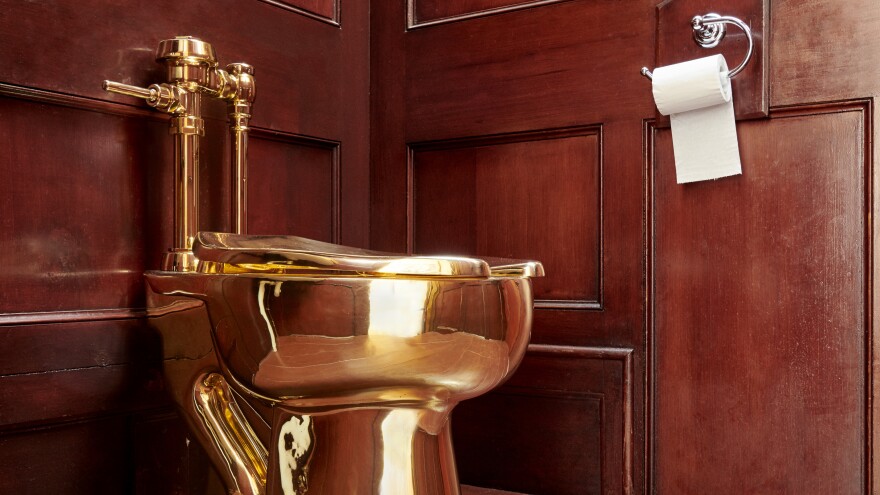British police have arrested a 66-year-old man in connection with the theft of a solid gold toilet from a palace west of London.
The toilet, titled America, is a work of art by the 58-year-old Italian artist Maurizio Cattelan. It had been installed for an exhibition at England's Blenheim Palace earlier this week.
Blenheim Palace confirmed the theft in a statement posted on Twitter.
"We are saddened by this extraordinary event, but also relieved no-one was hurt," the statement said. "We are grateful to our staff and to Thames Valley Police for their rapid and brave reactions."
Thames Valley Police believe a group of thieves used "at least two vehicles" to accomplish the task. They broke in overnight and left the scene around 4:50 a.m. local time.
The toilet — worth, by some estimates, up to $1.25 million — was connected to the plumbing of the building. As a result, its removal caused extensive damage. Blenheim Palace, a UNESCO World Heritage Site and the birthplace of Winston Churchill, announced Saturday that it would be closed for the day.
"It's not going to be the easiest thing to nick," Lord Edward Spencer-Churchill, brother of the Duke of Marlborough, told The Sunday Times in August. (The palace is the principal residence of the Dukes of Marlborough.) "Firstly it's plumbed in, and secondly a potential thief will have no idea who last used the toilet or what they ate. So no, I don't plan on guarding it."
America was installed as just one part of an exhibition of Cattelan's work, his first solo exhibition in the U.K. in two decades. Before it was stolen, visitors could book three-minute appointments to use the golden toilet.
The fact that America could actually function as a toilet was key to its message. It had previously been on display at the Guggenheim in New York, where it replaced the standard toilet in a small, single-unit museum restroom.
"The fact that it is very welcoming, inviting for anyone to use, gets to the heart of a lot of questions around exclusivity in the art world and museums in particular," Nancy Spector, the curator who worked closely with Cattelan on the Guggenheim exhibition, told NPR in 2016. "This notion of having a very intimate, private experience with a work of art, and a work of art that speaks dramatically about its own value, is fascinating on many levels."
"When you show the finest art to everyone, to the audience it was made for, you take a risk," Dominic Hare, Blenheim Palace's CEO, wrote in an emailed statement Saturday. "It is deeply ironic that a work of art portraying the American Dream and the idea of an elite object made available to all should be almost instantly snatched away and hidden from view."
Once, Cattelan did offer America to a more private residence: the White House. In 2017, after the Trump White House asked to borrow a Vincent van Gogh painting from the Guggenheim, Spector wrote back to say that the requested work was not available — but America was.
"We would be pleased to help facilitate this loan for the artist should the President and First Lady have any interest in installing it in the White House," Spector wrote in an email published by The Washington Post. "It is, of course, extremely valuable and somewhat fragile, but we would provide all the instructions for its installation and care."
Cattelan has been called "court jester of the art world." In 1996, when he was unable to come up with a piece of his own for an exhibition in Amsterdam, he stole another artist's entire work and attempted to claim credit for it. Cattelan is incredibly successful and has sold single works for more than $10 million.
NPR could not immediately reach Cattelan for comment on the theft of America. In 2018, when The Washington Post asked him what his work meant and why he offered it to the White House, Cattelan responded.
"What's the point of our life?" he said. "Everything seems absurd until we die and then it makes sense."
Copyright 2021 NPR. To see more, visit https://www.npr.org.


